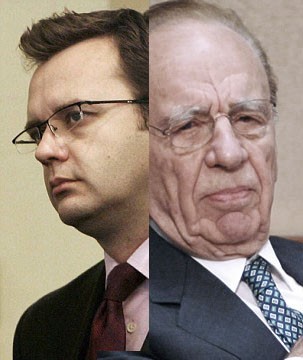| Swindles & Scams | Feb 25 2010 |


In Britain, a growing scandal has ensnared Rupert Murdoch, head of News International, and Andy Coulson, who was editor of the News International paper News of the World before becoming communications director for Conservative Party leader David Cameron. In short, News of the World hacked into voicemail accounts and computerized police records, and also extracted confidential information from banking computers. Murdoch claims to have known nothing about it, but yesterday a committee of MPs concluded an investigation into the matter by accusing News International execs of engaging in “obfuscation” and suffering from “collective amnesia.”
While Murdoch has taken some heat for the mess, the investigation into the hacking has increasingly turned toward Andy Coulson, who, while editor of News of the World, employed four private investigators to dig up dirt on public figures. Nineteen victims of the hacking have been identified, but records show that ninety-one were targeted. To make matters worse, Scotland Yard resisted investigating the matter, has refused to comply with Freedom of Information requests concerning the investigation, and failed to notify those whose cellphone pin codes were found in possession of one of News of the World’s PIs. This means that public figures who suspect being targeted by News of the World have been forced to launch their own investigations to discover whether they were victims.
 If all this seems to point toward a culture of criminality within News of the World, also consider that the paper recently paid a £792,000 settlement to a reporter who experienced harassment at the hands of Coulson, and last year paid out another large settlement to Professional Footballers Association head Gordon Taylor for illegally intercepting his phone records. Back then News International and Rupert Murdoch issued statements assuring the public that the reporter responsible for the phone tampering, Clive Goodman, was an “aberration” within the company. Now, half a year later, a bipartisan committee of MPs has described the hacking as having taken place “on an industrial scale.”
If all this seems to point toward a culture of criminality within News of the World, also consider that the paper recently paid a £792,000 settlement to a reporter who experienced harassment at the hands of Coulson, and last year paid out another large settlement to Professional Footballers Association head Gordon Taylor for illegally intercepting his phone records. Back then News International and Rupert Murdoch issued statements assuring the public that the reporter responsible for the phone tampering, Clive Goodman, was an “aberration” within the company. Now, half a year later, a bipartisan committee of MPs has described the hacking as having taken place “on an industrial scale.”Perhaps most interesting is the fact that, while Murdoch claims to have no knowledge of these matters, his newspapers, which he touts as exemplars of balanced reporting, hid the story in their Thursday editions. While The Guardian and other papers devoted multiple pages to what is one of the biggest scandals of the year and quoted directly from the official report, Murdoch’s Sun buried 135 words on the matter between an ad and a weather map of Ireland, his Times printed a mere 230 words, and his Daily Telegraph was able to manage only 325.
| Intl. Notebook | Dec 2 2008 |


The Dutch ban on mushroom sales, passed earlier this year, went into effect yesterday. The ban follows several highly publicized incidents involving mushroom usage, including the reckless joyride of a Danish tourist who careened through a public campground in his car, narrowly missing campers, and the death of 17-year old French girl who jumped from a bridge. Amsterdam’s city council hopes the new law will help change the international perception of the ’Dam as a sex, drugs and vice metropolis, but owners of “smart shops” where the fungi are sold say hundreds of jobs may be lost.
One shop worker complained in an interview with Britain’s Daily Telegraph newspaper that the problems were all the fault of tourists, especially Brits, who misuse alcohol at home then come to Amsterdam and do the same with hash and mushrooms. While it is true that vacationing Brits are notorious for binge consumption, the reputation of Amsterdam was established long before anyone began complaining about the behavior of tourists. Only time will tell if the mushroom ban will make people stop thinking of the city as a place to buy drugs, but in the meantime tourists can get the same trippy feeling by staring hard at a Van Gogh.




































































